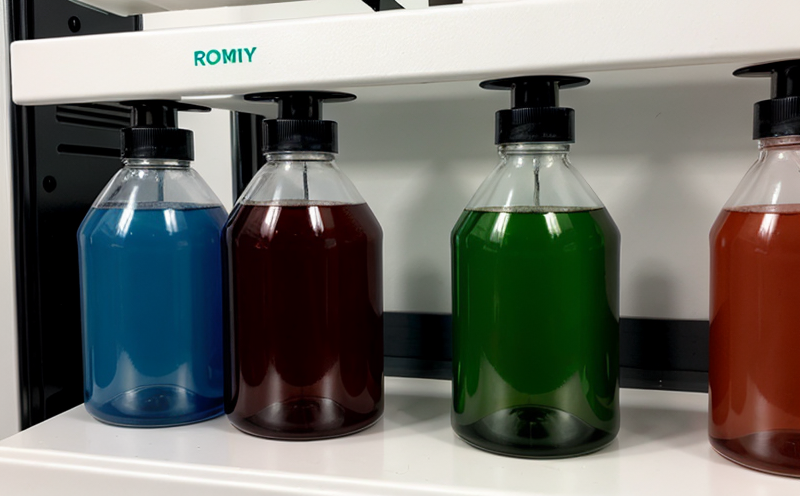BS 2782 Polymerization and Reactivity Testing of Plastics
BS 2782:1995 outlines methods for determining the reactivity of polymers, particularly focusing on free-radical polymerization reactions. This standard is crucial in ensuring that plastics undergo safe and predictable chemical reactions during processing or use. The test measures the rate at which a monomer forms a polymer under specified conditions.
The process involves carefully preparing samples by dissolving them in an appropriate solvent to form a clear solution, then titrating the solution with a suitable reagent such as hydrogen peroxide. The endpoint of this reaction is typically detected visually or through spectrophotometric analysis. This test not only evaluates the polymerization reactivity but also helps identify potential hazards associated with the use of reactive monomers.
Understanding the reactivity of polymers is essential for several reasons, including ensuring product safety and quality control during manufacturing processes. Reactivity testing ensures that raw materials behave as expected under various conditions, reducing the risk of unforeseen side reactions or degradation over time.
The test procedure includes precise temperature control and timing to simulate real-world scenarios accurately. For instance, some polymers may require specific temperatures for optimal reactivity, while others might exhibit different behaviors depending on humidity levels. By adhering strictly to the prescribed conditions outlined in BS 2782, laboratories can provide reliable data that contributes significantly to product development.
This testing method is widely used across industries where polymer chemistry plays a critical role, such as pharmaceuticals, automotive manufacturing, and consumer goods. It ensures consistent performance of materials throughout their lifecycle by identifying any inconsistencies early on in the production process.
Reactivity testing helps manufacturers comply with regulatory requirements and industry standards. For example, certain regulations mandate that specific types of plastics must meet particular reactivity thresholds to ensure they do not pose risks when exposed to heat or chemicals during use. By conducting rigorous tests like those specified by BS 2782, companies can demonstrate adherence to these standards.
The importance of accurate polymerization and reactivity testing cannot be overstated. It allows for more precise control over manufacturing processes, leading to higher quality products with extended shelf lives. Additionally, it supports continuous improvement efforts aimed at reducing waste generation and improving overall environmental sustainability practices within facilities.
- Identifies potential safety hazards early in the development stage
- Simplifies compliance with international regulations governing polymer usage
- Promotes consistent quality across batches of raw materials
- Supports innovation through better understanding of material behavior under different conditions
Why Choose This Test
Choosing BS 2782 Polymerization and Reactivity Testing offers several advantages for businesses involved in polymer science or manufacturing. Firstly, it provides valuable insights into the intrinsic properties of polymers that are essential for product design and development.
- Predicts how a polymer will behave under various conditions
- Ensures consistency across different batches of raw materials
- Supports regulatory compliance with international standards like ISO 9001:2015
- Facilitates safer handling practices by identifying potential risks associated with reactive monomers
The test also enables companies to optimize their production processes, ultimately leading to cost savings and improved efficiency. By understanding the reactivity of polymers before they enter the manufacturing pipeline, businesses can make informed decisions about process parameters such as temperature settings or reaction times.
Moreover, this testing method fosters innovation by encouraging research into new materials and formulations. With increased knowledge about polymer behavior under different conditions, developers are better equipped to create safer, more effective products.
In summary, selecting BS 2782 Polymerization and Reactivity Testing is a smart investment for any organization committed to quality control, safety, and sustainability in its operations.
International Acceptance and Recognition
The British Standard (BS) 2782:1995 has gained widespread acceptance globally due to its rigorous methodology and consistent results. It is recognized by numerous industry bodies and regulatory agencies worldwide, including the European Union (EU), United States Food and Drug Administration (FDA), and Canadian Standards Association (CSA).
Many companies across sectors such as healthcare, electronics, and construction rely on BS 2782 to ensure the safety and efficacy of their products. Compliance with this standard demonstrates a commitment to high-quality manufacturing practices and adherence to international standards.
By adopting this test protocol, organizations can access markets that require specific reactivity testing for certain types of polymers. For instance, medical device manufacturers may need to prove that their devices meet stringent reactivity criteria before they are approved for sale in various countries.
The international recognition of BS 2782 also enhances brand reputation and customer trust. Consumers increasingly demand products made from materials proven safe through recognized testing procedures like those specified by this standard. Companies that comply with such standards often receive positive feedback from customers who appreciate the extra layer of assurance provided by rigorous quality control measures.
Furthermore, participating in international forums and conferences focused on polymer science allows businesses to share best practices derived from using BS 2782. This collaborative approach fosters knowledge exchange among professionals working within this field, ultimately driving advancements in material science technology.
Environmental and Sustainability Contributions
Adhering to BS 2782 not only enhances product quality and safety but also contributes positively to environmental sustainability efforts. By ensuring that polymers react as intended, this test helps minimize waste generation throughout the manufacturing process.
- Avoids unnecessary disposal of improperly reacted materials
- Reduces energy consumption by optimizing production processes based on accurate reactivity data
- Promotes resource efficiency through better control over raw material usage
- Supports recycling initiatives by providing reliable information about polymer properties that can be recycled safely and effectively
The commitment to sustainability extends beyond manufacturing into product lifecycle management. By identifying potential risks early in the development stage, businesses can design products that are easier to recycle or repurpose at end-of-life without compromising on safety or performance.
Furthermore, compliance with international standards like BS 2782 fosters transparency and trust among consumers regarding environmental impact claims made by companies. This contributes towards building a more responsible industry committed to reducing its carbon footprint while promoting circular economy principles.





